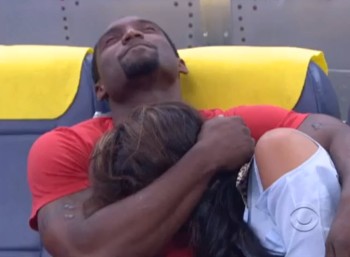 Just about the time crowds were gathering for Trayvon Martin vigils following the acquittal, representing a telling juncture in race progress or lack of it in this country, a lowly reality show was also shining a light on how long a road it still remains to a “post-racial America.”
Just about the time crowds were gathering for Trayvon Martin vigils following the acquittal, representing a telling juncture in race progress or lack of it in this country, a lowly reality show was also shining a light on how long a road it still remains to a “post-racial America.”
“Big Brother” had been criticized earlier in its 15th season for allowing and then hiding racist and insensitive comments made during the 24-hour feed watching a dozen or so young people — who are largely not deep thinkers or particularly considerate — scheme away their summer for our entertainment.
Actually, the live feeds are often several days behind the edited action as depicted on the broadest shows, which fill the summer prime time three nights a week.
So when the comments of a couple of blonde Mean Girls on the show were edited together, followed by statements of concern (in the “confessional”) from their targets, it began to show how bits of racial bating continue in America unabated.
When the worst of the offenders, ironically named Aaryn (but not yet called Aryan) was not only quoted repeatedly but confronted by another houseguest who advised her to cool it, she replied coldly, “I wish I cared more about this. But I don’t.”
On Sunday’s episode, prepared before the Trayvon Martin verdict and its reopening of the gaping national wound, it was the main storyline for an episode that began with a CBS disclaimer about the racist remarks made on the show.
With a minority in charge — D.C. based Helen, an Asian-American who is playing the game about as well as anyone has played it in years — the former majority of racists and bullies retreated into a bedroom they tried to takeover, despite their demonstrated power loss.
Aaryn upended the bed of African-American woman named Candace and then made fun of her and talked back to her in what she imagined was “ghetto talk” when she was surprised by this childish display.
When Howard, the muscled African-American, took her aside and told her to ignore it as she cried, it seemed to embody the kind of years of abuse in America for those of another color in a way that not only do no other reality shows display, but few other scripted shows do either.
They had to endure it just a little longer, he told her, though it hurt him to even say it; they were on the winning side, he consoled her. I’ve always been drawn to reality shows, often to the ridicule of my family and friends, because of one factor: Amid the most contrived situations, it was always interesting to see how people interacted with one another and made the decisions they did – the glints of honest behavior shone through no matter how bad the show.
And on a night when many had a heavy heart on what it meant when a jury made it OK for a man to shoot and kill an unarmed teenager, it seemed to articulate how much longer of a road the country needed to go in a summer that marks the 50th anniversary of Martin Luther King’s “I Have a Dream” speech next month.